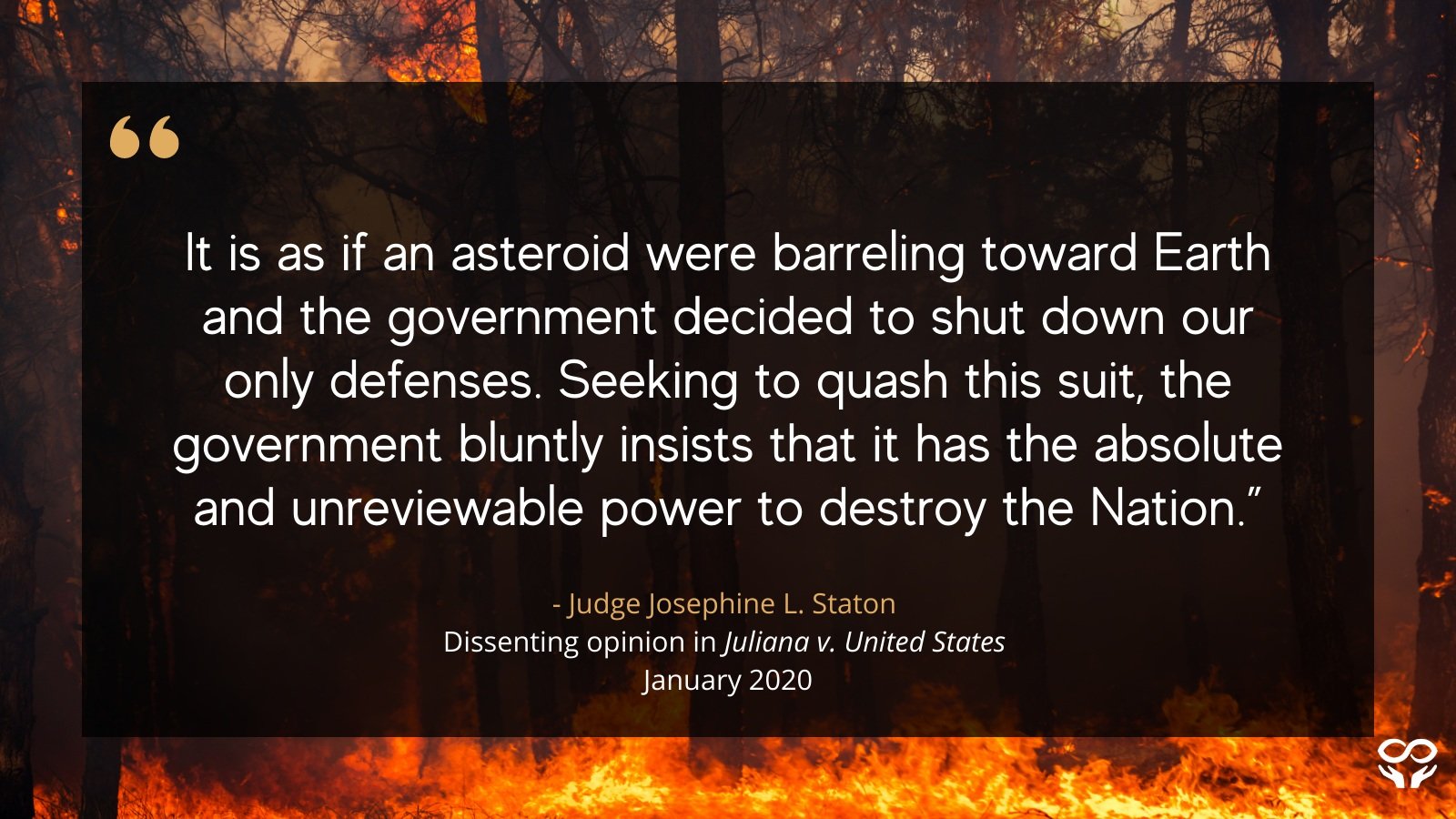“Exercising my ‘reasoned judgment,’ I have no doubt that the right to a climate system capable of sustaining human life is fundamental to a free and ordered society.” - U.S. District Judge Ann Aiken
JULIANA v. UNITED STATES
Current Status
For nearly a decade, the Juliana 21 have asked the courts to hear their case and recognize and enforce their rights to life and a livable climate. And for nearly a decade, their own government has abused its power and misused the law to silence them.
On December 29, 2023, U.S. District Court Judge Ann Aiken ruled in favor of the Juliana 21, putting an end to the DOJ’s motions to dismiss the case, and allowing the youth plaintiffs to continue on the path to trial. The parties were set to receive trial dates from Judge Aiken on January 19, 2024.
However, on February 2, 2024, the Biden Administration’s DOJ filed an unprecedented seventh petition for a writ of mandamus at the Ninth Circuit and a motion for a stay. A writ of mandamus is an extreme legal tool meant for only the most dire of exigent circumstances, misused by the Trump Administration at record levels to subvert the normal legal process, prevent the case from proceeding to trial, and silence the voices of young people seeking to highlight the injustice of climate change at the hands of the United States government.
On April 19, 2024, Judge Ann Aiken rebuked the DOJs attempts to silence the 21 youth plaintiffs when she filed an answer to the DOJs seventh Petition for Writ of Mandamus and denied the DOJ’s motion to stay the case while the Ninth Circuit considers the mandamus request.
“Trial courts across the country address complex cases involving similar jurisdictional, evidentiary, and legal questions as those presented here without resorting to interlocutory appeal or petitioning for a writ of mandamus,” Judge Aiken wrote. Quoting from an earlier case, she noted, “the proper place for the trial is in the trial court.”
Despite the amicus brief filed by members of Congress and Judge Aiken's powerful filings in support of the youth plaintiffs, on May 1, 2024, the Ninth Circuit unjustly granted the DOJs outrageous seventh Petition for Writ of Mandamus. This decision offers a dire reminder that the courts are vital to a functioning democracy. The court’s opinion that declaring dangerous and discriminatory government systems unconstitutional doesn’t matter, is simply false.
FILING AT THE U.S. SUPREME COURT
On December 9, 2024, the Juliana 21 filed a Petition for Certiorari with SCOTUS, asking the Court
to review two Ninth Circuit decisions from 2020 and 2024 dismissing the case based on a ruling that the plaintiffs had not shown that their claims against the government could be redressed by a judgment in their favor. The youth plaintiffs argue that the Ninth Circuit’s decision conflicts with the law of standing in other circuits, Supreme Court precedents over the past 100 years, and undermines Acts of Congress.
They emphasize that every judge who has reviewed their claims, both in the district court and the Ninth Circuit, concluded that they have demonstrated they are suffering personal harm, and that their ongoing injuries are directly traceable to government actions.
In truth, SCOTUS sets the standard on the question of declaratory relief, and the three-judge panel’s dismissal in the Ninth Circuit flies in the face of long-standing Supreme Court precedent, which says the courts can absolutely act to protect young people’s constitutional rights when violated by their own government.
On January 13, 2025, 43 members of Congress, Public Justice, and the Montana Trial Lawyers Association (MTLA) filed amicus briefs at SCOTUS, asking them to grant the youth’s petition for certiorari and send them to trial. Members of Congress called on the court to correct the Ninth Circuit's overreach and the group of lawyers raised critical arguments about the government’s use of mandamus to block the trial. On February 12, 2025, the defendants filed a brief opposing the plaintiffs’ petition for cert and the parties now await a ruling from SCOTUS.
U.S. SUPREME COURT DENIES PETITION FOR CERTIORARI
On March 24, 2025, SCOTUS denied the Juliana 21’s petition for certiorari, bringing an end to a nearly decade-long legal battle to have their claims heard in U.S. courts.
Continuing the fight for climate rights
In addition to ongoing legal efforts in the United States, Our Children’s Trust is exploring bringing the Juliana cause to international venues, where issues of climate rights and governmental responsibility to protect young people’s futures can be examined under the framework of international law. Several global institutions offer opportunities for youth to be heard, so that plaintiffs’ rights can be given due consideration on the world stage.
In 2015, 21 young Americans filed their constitutional climate lawsuit, Juliana v. United States, against the U.S. government. Their complaint asserts that, through the government's affirmative actions that cause climate change, it has violated the youngest generation’s constitutional rights to life, liberty, and property, as well as failed to protect essential public trust resources.
major moments timeline
The following is a timeline of major moments, filings, and rulings in this case, from 2015 to today (a downloadable, text only, version of this timeline can be found here):
power forward together
The world’s only non-profit public interest law firm dedicated exclusively to securing the legal rights of youth to a healthy atmosphere and safe climate, based on the best available science.




